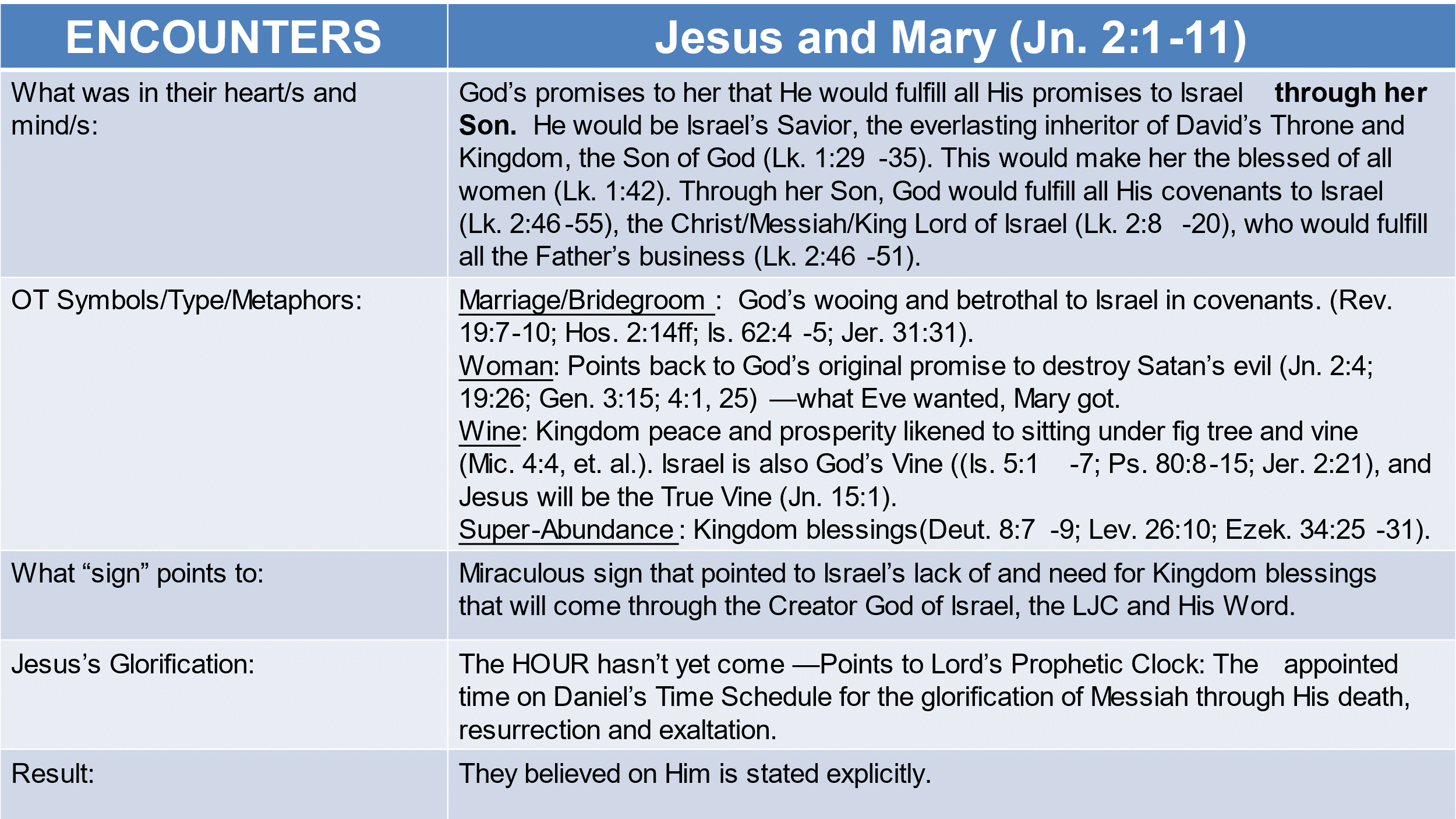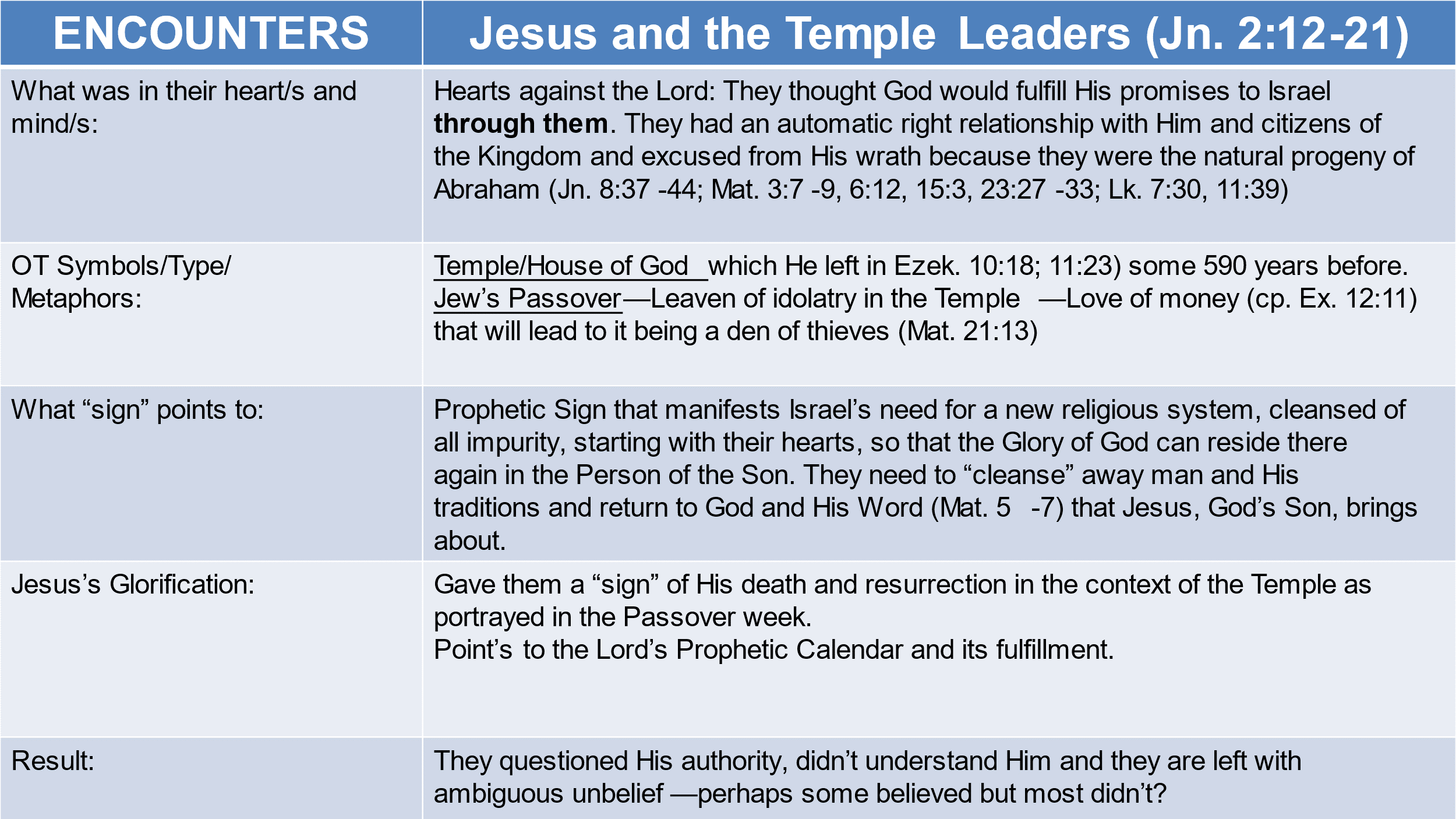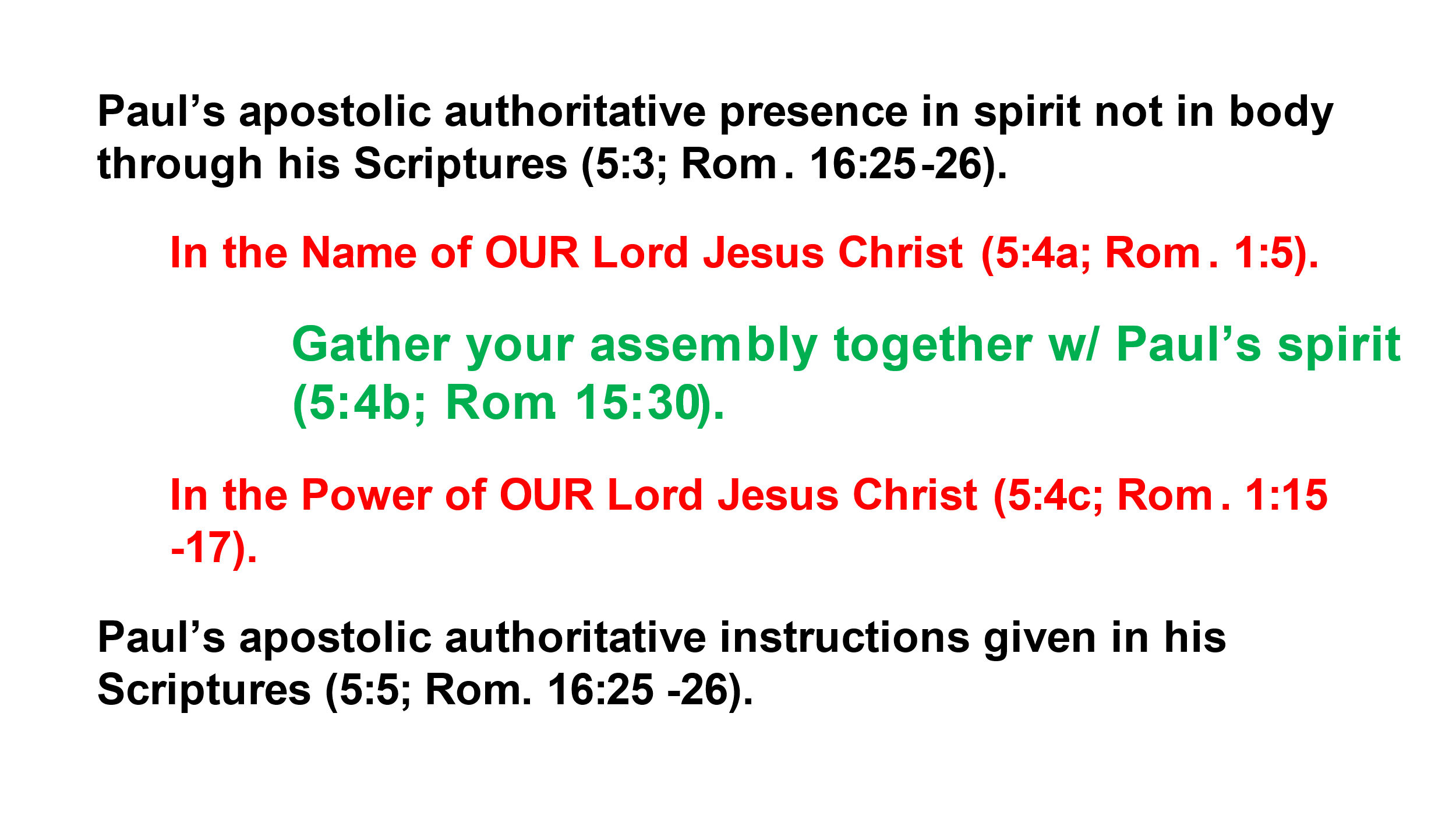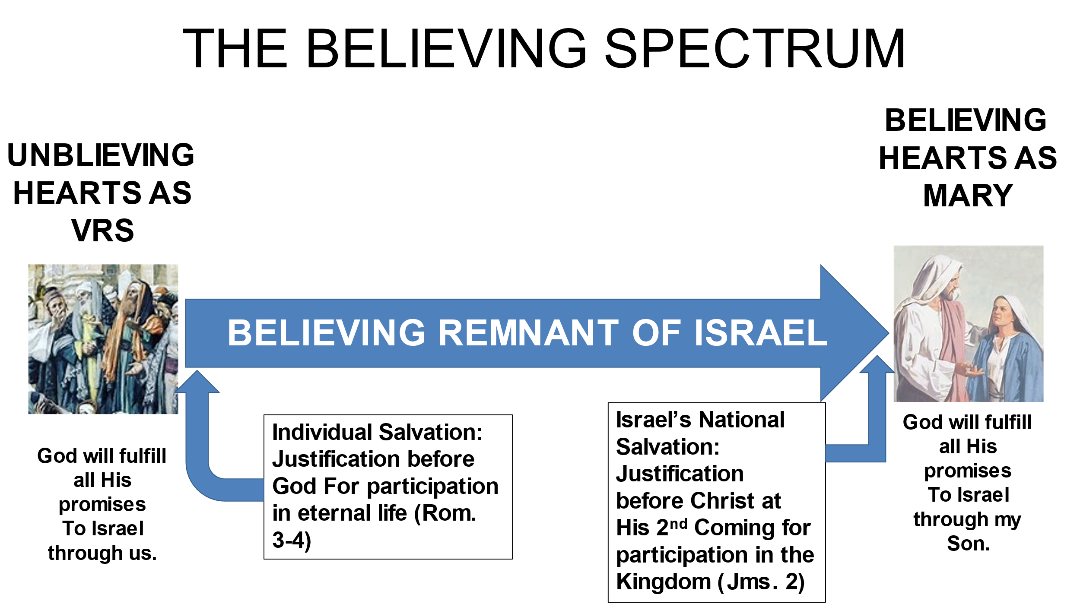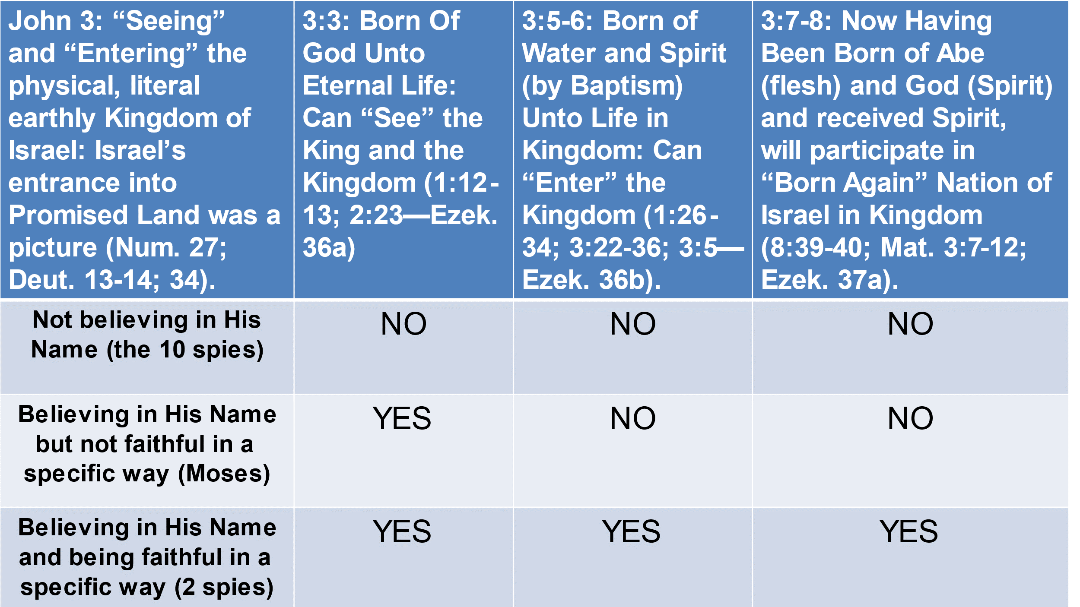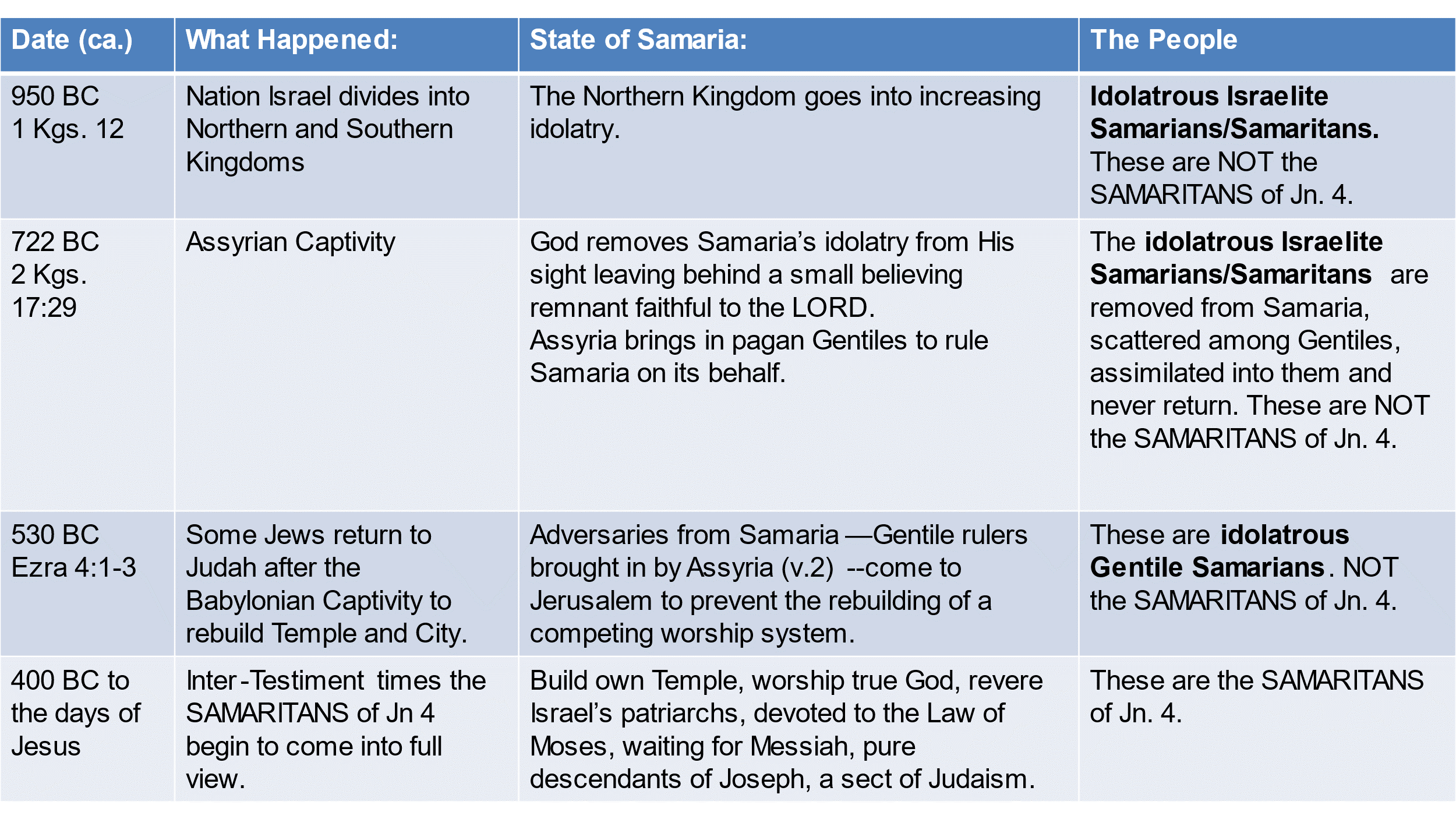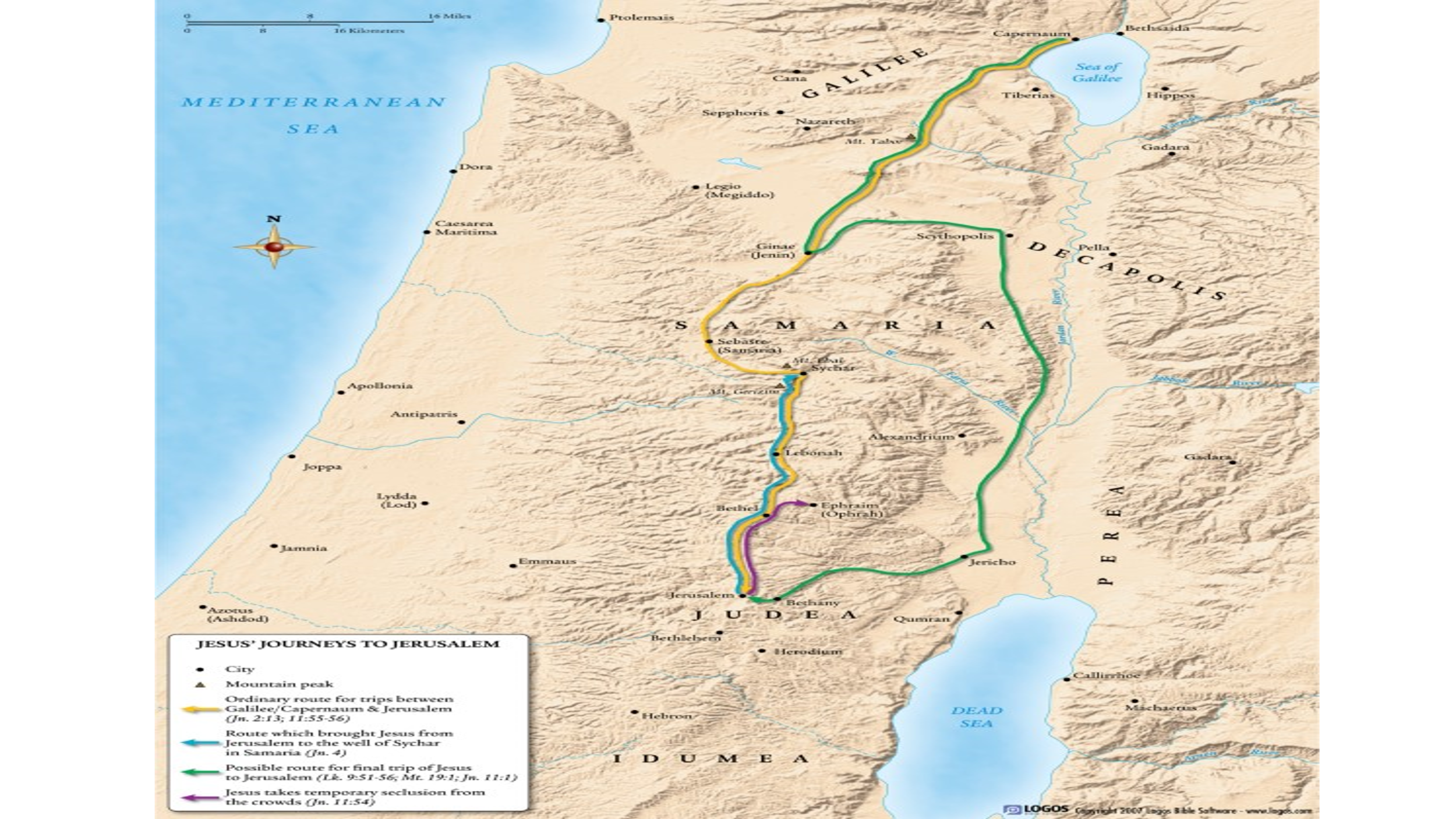In our study of the Gospel of John, one question that comes up repeatedly is the concept of Israel's NATIONAL salvation. Because this is a critical concept to understanding the non-Pauline Scriptures, I have taken a closer look at it in the Highlights Article below.
Israel And Her Two Salvations
One of the most important things we have to understand about the Bible rightly-divided is that the non-Pauline Scriptures are the revelation of God's Prophetic Program with the Nation of Israel while the Pauline Scriptures are the revelation of God's Mystery Program with the Body of Christ. As such, it is important to realize that when the non-Pauline Scriptures refer to salvation and forgiveness of sin, they are usually referring not first to INDIVIDUAL, PERSONAL salvation and forgiveness of sins but to the Nation of Israel's NATIONAL salvation and NATIONAL forgiveness of sins. Of course, the two salvations—NATIONAL AND PERSONAL--intertwine. For Israelites to participate in Israel's NATIONAL salvation (through faithfulness), they must have already received INDIVIDUAL/PERSONAL salvation (through faith).
But they also must be distinguished because they present different depths and aspects of the Righteousness of God. The NON-Pauline Scriptures fully reveal, manifest and display the Righteousness of God in saving His FRIENDS while destroying His (and Israel's) enemies in accord with the Grace resident in God's Jehovah Name and the Abrahamic Covenant (Gen 12:3; almost any Psalms, Exodus account, et al.). This manifestation of God's Righteousness explains how He will save and restore the NATION of Israel so that He can make her the conduit of His salvation to the Gentile NATIONS based on faith PLUS works.
The Pauline Scriptures, however, fully reveal, manifest and display the Righteousness of God in saving His ENEMIES because He has no friends in accord with His Riches of Grace (Rom. 3-5, esp. 3:21-26; 5:6-10; Eph. 1:3-14; 2:4-7). This manifestation of God's Righteousness explains how God has provided, is providing and always will provide salvation to INDIVIDUAL enemy sinners, which includes giving them PERSONAL forgiveness of their sins based on faith alone WITHOUT works (Rom. 4:1-8; Eph. 2:8-9; etc.). Saul/Paul, the archenemy of God, the persecutor of Christ and His followers, is the pattern for this righteousness and salvation (1 Tim. 1:13-16; Acts 8:1-4).
Now, with all this in mind, we can appreciate that John 1-4 is not primarily about individual evangelism and personal salvation (as those who don't rightly-divide suggest). Rather it is about Israel's NATIONAL salvation, which begins in Jerusalem (Jn. 2:13-3:21), progresses out to Judea (Jn. 3:22-4:3) and then MUST NEEDS go to Samaria (Jn. 4:4-43), completing the picture of Israel's NATIONAL salvation. And when this happens, the saved and restored NATION of Israel will take salvation out to the rest of the world (Jn. 4:42; Acts 1:8; 3:12, 25-26). Of course, this didn't happen at that time because Jerusalem rejected their King and Messiah, the Lord Jesus Christ, thereby shutting down the whole progression at its very starting point. Jesus, instead of continuing by going out to the world, just returned to Galilee (Jn. 4:43-54).
Why did Jesus do this? And why did John put it at the beginning of his Gospel Account? Jesus did it to give His disciples a foretaste of and an instruction video on how Israel's NATIONAL salvation—Israel's NATIONAL re-unification and restoration--would occur so that they can continue this work after He is gone (Jn. 4:31-38).
In summary, the Israelites not only needed to participate in INDIVIDUAL salvation and PERSONAL forgiveness of sins (justification before God and His Tribunal unto eternal life by faith), they also needed to participate in Israel's NATIONAL salvation and NATIONAL forgiveness of sins (justification before Christ at His 2nd Coming by faith plus works), becoming God's true restored Nation of Israel in her long-promised Kingdom of God on the Earth. Let's see how this works with a few illustrations:
ILLUSTRATION FROM MODERN HISTORY
The classic illustration of this is Germany in WWII. Not everyone in Germany at that time was pro-Nazi. Not every individual German participated in its atrocious sins. In fact, many worked against the Nazis and provided avenues of escape for many people, especially Jews. Yet when sanctions and punishments were applied to Germany, they applied to all German citizens whether they were involved with the Nazis or not. It didn't matter. All that mattered was whether you were German or not. In other words, all Germans were associated with Germany's NATIONAL debt of sin even if they didn't do any of those sins themselves.
But the Allies weren't just interested in punishing Germany. They were also interested in Germany becoming a stable, democratic, responsible nation that could contribute to the world. If they just kept the NATION under its enormous, unpayable debt of sin, Germany would have become even more dangerous and irresponsible than she was before. So, to “save” and restore the NATION of Germany, the Allies forgave Germany's NATIONAL debt and actually began giving them financial and other material support so that they could rebuild the NATION.
It is important to recognize while the NATION was forgiven so that it could be “saved” as a NATION, not all INDIVIDUAL Germans participated in that NATIONAL forgiveness of sin. The Nazi leaders and co-workers were pursued aggressively and convicted of war crimes. To use biblical terminology: If the world and human sight were perfect, ALL the INDIVIDUAL “unsaved” citizens of Germany—the Nazis and their helpers—would be destroyed, and ALL the INDIVIDUAL “saved” citizens of Germany—those who rejected the Nazis and resisted—would participate in Germany's NATIONAL salvation and forgiveness of sins in the restored NATION.
With this illustration in mind, the concept of someone being associated with their NATION'S sin is a common everyday concept. I remember going to grammar school in the 60s, and there was a boy in my class that was of German heritage. He spoke perfect English, but his parents, who left Germany after the war, only spoke broken English and that with a strong German accent. Many kids in my class ridiculed that little boy because they associated him with Germany's NATIONAL sin, even though he had absolutely nothing to do with it. He hadn't even been born yet!
BACK TO THE BIBLE AND ISRAEL
The same kind of thing is true of the NATION of Israel. For 1500 years Israel rejected God and His Word God, falling under the Curses of the Law and the Courses of Punishment (Lev. 26), thereby accruing an enormous, astronomical, unpayable, NATIONAL debt of sin (10,000 talents--Mat. 18:24) before God. Just as with Germany, to save and restore Israel and make her the conduit of His salvation to the Gentiles, God would need to first remove, pay off, Israel's NATIONAL debt of sin. He did this through Christ's shed blood on the Cross (for His friends—Jn. 15:13), which provided the basis for the New Covenant (Mat. 26:28). The New Covenant on the one hand cleanses and separates believing Israel from Israel's NATIONAL debt of sin and on the other hand gives the Spirit, who will cause them to walk in the commandments of God so that they can receive the blessings of the Law rather than its curses, thereby ensuring that they never accrue a NATIONAL debt of sin ever again (Jer. 31:31-34; Ezek. 36:25-27).
In short, God will take believing Israelites, who have already received INDIVIDUAL salvation and PERSONAL forgiveness of sin by faith alone (justification before God and His Tribunal) and places them into the Believing Remnant of Israel where they are given the opportunity to also participate in Israel's NATIONAL salvation and forgiveness of sins by faithfulness (justification before Christ at His 2nd Coming by faith plus works) for entrance into the Kingdom and attaining a privileged position there.
DANIEL, JOHN THE BAPTIST AND JESUS
In Israel's history, Daniel gives a classic example of how this is supposed to work for Israel. The general pattern that leads to NATIONAL Israel's healing and restoration goes like this: Israel goes away from God ... God appeals to Israel based on the Grace resident in His Jehovah Name ... they return to the LORD through NATIONAL repentance and confession of sins ... and God heals and restores them as a nation (Ex. 32-34; Num. 21:9; Book of Judges).
With this in mind let's pick it up with Daniel. Daniel was taken captive to Babylon. Near the end of Israel's 70 year stay there (according to Jer. 25:11), he prays for Israel's NATIONAL salvation (Dan. 9:1-19). His “my” confession and repentance of sins in Dan. 9:4 immediately becomes “we” in v. 5. In other words, Daniel's confession here isn't really about him INDIVIDUALLY but about him as a member of the fallen and ruined and dead NATION of Israel. While Daniel was certainly a sinner and committed iniquity (Dan. 9:5), he most certainly hadn't done wickedly or rebelled against God or departed from the precepts of God (Dan. 9:5b)! Daniel was one of the good prophets, faithful to the LORD in every detail of his life (Dan. 1-8). He is not one who refused to listen to the prophets (Dan. 9:6a)! It was the kings and princes and fathers and people of Israel as a whole, as a NATION, who refused to hear God. Yet Daniel was associated with that NATIONAL sin of Israel not because he actually did it but simply because he was an Israelite.
Daniel wasn't confessing his own PERSONAL sins so that he could receive INDIVIDUAL salvation and PERSONAL forgiveness of sins (he most assuredly had that by faith already!). Rather, as an Israelite, he was associated with Israel's NATIONAL debt of sins even though he wasn't personally involved in it. In Dan. 9, he is participating in Israel's NATIONAL confession of sins so that he could participate in Israel's NATIONAL salvation and forgiveness of sins that will be fulfilled at Christ's 2nd Coming.
Now, jump ahead some 500 years, and we find John the Baptist breaking the 400 years of the silence of God by calling on believing Israel to join with him in confessing and repenting of the NATION'S sins and their association with it, returning to the LORD so that He can heal and restore them NATIONALLY. In short, John the Baptist announces that the King is present, and the Kingdom is at hand, Israel get ready for your LORD, prepare His way—pray as Daniel did for Israel's NATIONAL salvation.
But let's take another step and go to Jesus's Sermon on the Mount where He gives what is traditionally called the Lord's Prayer (Mat. 6:9-13). Most dispensationalists use this passage to demonstrate the distinction between Law and Grace. Under the Law they were to first forgive others, and then God would forgive them. Whereas today under Grace, God first forgives us, therefore, we should forgive others (Eph. 4:32). But this misses the whole point of what Jesus is doing here.
Notice the pronouns Jesus uses in this prayer: OUR (Jesus and His listeners) Father who art in Heaven ... Thy Kingdom Come. They will be done in Earth as it is in Heaven ... Give US (Jesus and His listeners) OUR (Jesus and His listeners) daily bread and forgive US (Jesus and His listeners) OUR (Jesus and His listeners) debts as WE forgive others. Notice that in using OUR, US, WE, Jesus includes Himself in the prayer! Therefore, the issue here can't be about how they participate in INDIVIDUAL, PERSONAL forgiveness of sins because Jesus had no INDIVIDUAL, PERSONAL sins!!
Rather, Jesus is talking about how they can participate in God's forgiveness of Israel's NATIONAL debt of sin. Jesus, as an Israelite, and just like Daniel and all other Israelites, was associated with Israel's NATIONAL debt of sin. What Jesus is saying here to the members of the Believing Remnant of Israel (who as believers already had their own INDIVIDUAL, PERSONAL sins forgiven!) was that they needed to be separated and cleansed from all their association with Israel's NATIONAL debt of sins so that God could use them to create His Own restored, true—DEBT-FREE servant--NATION of Israel through their faithfulness, especially during the Tribulation Period.
God's true “end-time” Nation of Israel will be made up, yes, of INDIVIDUALS, who have been PERSONALLY saved and forgiven all their INDIVIDUAL, PERSONAL sins by grace through faith (for the full explanation and manifestation of how this is possible and how it works, you have to go to Paul's Scriptures). But in God's Prophetic Program, they as a group (the Believing Remnant of Israel) also needed to participate in Israel's NATIONAL forgiveness of sins because that is what will separate and cleanse them from all association with Israel's NATIONAL debt of sin so that God can make of them His Own debt-free NATION (and for the full explanation and manifestation of how this is possible and how it works, you have to go to the non-Pauline Scriptures).
